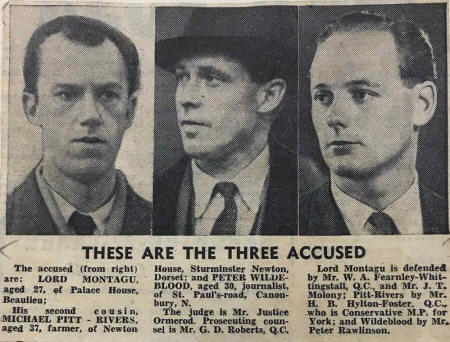

Queer Places:
Radley College, Kennington Rd, Radley, Abingdon OX14 2HR, Regno Unito
University of Oxford, Oxford, Oxfordshire OX1 3PA
Beach House, Warren Ln, Brockenhurst SO42 7XH, Regno Unito
 Peter Wildeblood (19 May 1923 – 14 November 1999) was an Anglo-Canadian
journalist, novelist, playwright and gay rights campaigner. He was one of the
first men in the UK to publicly declare his homosexuality.
Peter Wildeblood (19 May 1923 – 14 November 1999) was an Anglo-Canadian
journalist, novelist, playwright and gay rights campaigner. He was one of the
first men in the UK to publicly declare his homosexuality.
Peter Wildeblood was born in Alassio, on the Italian Riviera, in 1923. He was the only child of Henry Seddon Wildeblood (b. 1863), a retired engineer from the Indian Public Works Department, and his second wife, Winifred Isabel, née Evans, the daughter of a sheep rancher in Argentina. He was brought up in his parents' cottage near Ashdown Forest.[1] His mother was considerably younger than his father, and Wildeblood later wondered if that had affected his development.
Wildeblood won a scholarship to Radley College and then went up to Trinity College, Oxford, in 1941, but dropped out after ten days because of ill health. Soon afterwards, he volunteered for the Royal Air Force and trained as a pilot in Southern Rhodesia. However, after a series of crashes, he was grounded and instead became an RAF meteorologist, remaining in Southern Rhodesia for the rest of the war.[2] After demobilisation, he resumed his place at Trinity College, where he gravitated towards a homosexual circle in the theatre and arts.[3]
After Oxford, Wildeblood turned to journalism, writing for the Daily Mail's regional office in Leeds, then in Fleet Street itself, first as the royal correspondent, then as its diplomatic correspondent. At this time, Wildeblood began an affair with an RAF corporal called Edward McNally and wrote him a series of passionate love letters. It was these letters which proved a crucial part of the evidence leading to Wildeblood's later conviction for conspiracy to incite acts of gross indecency.[1]
In the summer of 1952, Edward Douglas-Scott-Montagu, 3rd Baron Montagu of Beaulieu had offered Wildeblood the use of a beach hut near his country estate. Wildeblood brought with him two young RAF servicemen: his lover Edward McNally, and John Reynolds. The foursome were joined by Montagu's cousin Michael Pitt-Rivers. At the subsequent trial, the two airmen turned Queen's Evidence, and claimed there had been dancing and "abandoned behaviour" at the gathering. Wildeblood said it had in fact been "extremely dull". Montagu claims that it was all remarkably innocent, saying: "We had some drinks, we danced, we kissed, that's all."[4]
Arrested on 9 January 1954, in March of that year Wildeblood was brought before the British courts charged with "conspiracy to incite certain male persons to commit serious offences with male persons" (or "buggery").[5] Wildeblood was charged along with Lord Montagu and Michael Pitt-Rivers, and during the course of the trial he admitted his homosexuality to the court.[6] Montagu received a 12-month sentence, while Wildeblood and Pitt-Rivers were sentenced to 18 months in prison as a result of these and other charges. The result of the trial led to an inquiry resulting in the Wolfenden Report, which in 1957 recommended the decriminalisation of homosexuality in the UK.[2] Wildeblood's testimony to the Wolfenden committee was influential on its recommendations.
He published a book on the case, Against the Law, in 1955, an account which detailed his experiences at the hands of the law and the British establishment, brought to light the appalling conditions in HM Prison Wormwood Scrubs, and encouraged campaigns for prison reform and for reform of law regarding homosexuality. C. H. Rolph wrote in the New Statesman that Against the Law was "the noblest, and wittiest, and most appalling prison book of them all". To Wildeblood, "it was merely part of the story which had been implicit in me from the day when I was born".
He wrote a second book on the subject of homosexuality the following year, propelled (according to him in the first chapter) by the strong response to Against the Law from people who contacted him directly to say how grateful they were for bringing the subject into the open. A Way of Life included twelve essays describing different lives lived with homosexuality among people with whom he had come in contact. The essays served further to normalise homosexuality and reveal its then still hidden existence in all walks of life.[7]
After the trial and his subsequent imprisonment, Wildeblood became a television producer and writer and was involved in a number of productions (particularly for Granada Television and then CBC Toronto) throughout the 1960s and 70s.[8] Wildeblood wrote the book and lyrics, to Peter Greenwell's music, for the London musical The Crooked Mile, an avant-garde piece of 1959, set in the Soho underworld. He also chose to campaign publicly for the rights of gays by testifying before the Wolfenden Committee and the House of Lords.
His role in the decriminalisation of homosexuality, which occurred in 1967, was explored in the Channel Four docudrama A Very British Sex Scandal,[9] and the 2017 BBC docudrama Against The Law,[10] based on his book.
Wildeblood moved to Canada, becoming a citizen of the country in the 1980s.[11] In 1994, he suffered a stroke which left him without the power of speech and quadriplegic. He died in Victoria, British Columbia, in 1999.[2]
My published books: